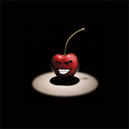Missed connections and missing links
2.25/5.0



The title track starts out awesome, opening with a heavily compressed guitar riff joined shortly afterwards by a harmonized guitar in the foreground. The tone has the visceral slam of AC/DC, but with a mellower retro blues rock pace. The reverberating vocals line up quite nicely with that, giving me a good idea of what it might sound like if Mick Fleetwood fronted a Black Sabbath tribute band. The droning guitars and thick pentatonic riffs conjure up a raw intensity. The bridge turns to old school psychedelia, reminding me of Status Quo's "Pictures of Matchstick Men", and I'm caught up in the hypnotic swirl of distorted guitars. The best part is that it keeps showing kaleidoscope flashes of almost recognizable riffs: a touch of "Iron Man" here, a smear of "Sister Ray" there.
So, six minutes in, I'm thinking this could be the start of something great and I settle in for more. The Bohannon brothers' twin guitar assault continues on "White Widow". The classic rock vamp at the start isn't as catchy as the first track, but the band still plows into the full sound with enthusiasm. The music is pretty decent and the lead near the end throws in some speedier runs, but the initial attraction is starting to fade, in large part because the lyrics can't hold the song together. They sing the lines with gusto, but it's hard to pull a linear theme from lines like, "Who's to say you're out of touch/ Just because you feel so much/ I just got born/ And then I died."
From here, the die is cast: the solid guitar work can never quite overcome the vague or repetitive lyrics. Bohannons slog through a string of hard hitting garage rock, but they never find the momentum that seemed so natural on the title track. Songs like "Dias de Los Muertos" or "Lightning and Thunder" plod along and never really deliver any satisfaction. The best of the lot, "Death and Texas", has a righteous Neil Young shred (in fact it's fairly derivative), but the platitudes about illness and loss offer little insight: "To watch you fade / Day by day / Has got me a little down on God / And his mysterious ways."
I toughed it out to the end, hoping I could salvage some of the magic of that initial taste. The final tune, "Red, White, Black and Pale", is a doom-filled, apocalyptic vision but it doesn't measure up to anything Mike Doughty wrote for his recent ambitious musical, Revelation: A Rock Opera. So, no magic miracles to save the day. It's rare to turn so sharply from hot to cold on an album like this, and I began to doubt my memory. Was I suckered in somehow at the start or did Bohannons lead with an uncharacteristically strong tune? Unlike a disastrous date, there was an easy way to check the facts. I steeled myself, hit replay, and dove back into "Black Cross, Black Shield".
On the second listen, I still enjoyed the song's classic metal grind and dynamic pacing, but I also noticed some cracks in the facade. In particular, the similarity between the chorus and Harry Chapin's "Cat's in the Cradle", became impossible to ignore, even though the band cloaks it in wailing guitar tone. That revisit makes it easier for me to send Black Cross, Black Shield on its way with no regrets. It's not fundamentally flawed, but we're just not compatible after all.
2.25/5.0




Did you ever have one of those first dates that started out so promising, but then left you checking your watch, waiting for it to be over? It's like the person could hold it together for the first five or six minutes, but no matter how intriguing and cool they seemed then, the rest of the evening had them unraveling until you wondered if that first impression was just a fluke. Maybe you even began to question your earlier enthusiasm. That's exactly where I find myself with Bohannons' Black Cross, Black Shield.
The title track starts out awesome, opening with a heavily compressed guitar riff joined shortly afterwards by a harmonized guitar in the foreground. The tone has the visceral slam of AC/DC, but with a mellower retro blues rock pace. The reverberating vocals line up quite nicely with that, giving me a good idea of what it might sound like if Mick Fleetwood fronted a Black Sabbath tribute band. The droning guitars and thick pentatonic riffs conjure up a raw intensity. The bridge turns to old school psychedelia, reminding me of Status Quo's "Pictures of Matchstick Men", and I'm caught up in the hypnotic swirl of distorted guitars. The best part is that it keeps showing kaleidoscope flashes of almost recognizable riffs: a touch of "Iron Man" here, a smear of "Sister Ray" there.
So, six minutes in, I'm thinking this could be the start of something great and I settle in for more. The Bohannon brothers' twin guitar assault continues on "White Widow". The classic rock vamp at the start isn't as catchy as the first track, but the band still plows into the full sound with enthusiasm. The music is pretty decent and the lead near the end throws in some speedier runs, but the initial attraction is starting to fade, in large part because the lyrics can't hold the song together. They sing the lines with gusto, but it's hard to pull a linear theme from lines like, "Who's to say you're out of touch/ Just because you feel so much/ I just got born/ And then I died."
From here, the die is cast: the solid guitar work can never quite overcome the vague or repetitive lyrics. Bohannons slog through a string of hard hitting garage rock, but they never find the momentum that seemed so natural on the title track. Songs like "Dias de Los Muertos" or "Lightning and Thunder" plod along and never really deliver any satisfaction. The best of the lot, "Death and Texas", has a righteous Neil Young shred (in fact it's fairly derivative), but the platitudes about illness and loss offer little insight: "To watch you fade / Day by day / Has got me a little down on God / And his mysterious ways."
I toughed it out to the end, hoping I could salvage some of the magic of that initial taste. The final tune, "Red, White, Black and Pale", is a doom-filled, apocalyptic vision but it doesn't measure up to anything Mike Doughty wrote for his recent ambitious musical, Revelation: A Rock Opera. So, no magic miracles to save the day. It's rare to turn so sharply from hot to cold on an album like this, and I began to doubt my memory. Was I suckered in somehow at the start or did Bohannons lead with an uncharacteristically strong tune? Unlike a disastrous date, there was an easy way to check the facts. I steeled myself, hit replay, and dove back into "Black Cross, Black Shield".
On the second listen, I still enjoyed the song's classic metal grind and dynamic pacing, but I also noticed some cracks in the facade. In particular, the similarity between the chorus and Harry Chapin's "Cat's in the Cradle", became impossible to ignore, even though the band cloaks it in wailing guitar tone. That revisit makes it easier for me to send Black Cross, Black Shield on its way with no regrets. It's not fundamentally flawed, but we're just not compatible after all.

 The biggest promise of punk rock was how it challenged the excesses of progressive rock. By reasserting music's folk roots, punk sucker-punched master musicians and their egos to assert that anyone could try their hand at it. It needn't take talent to start a band and there were no record executives to impress. Audiences rewarded the bands that created the most enthusiastic shows or vented the most spleen or had the most outrageous songs. The downside was that there was plenty of mediocre crap to wade through, but it was worth it to come across a group that had captured something special.
The biggest promise of punk rock was how it challenged the excesses of progressive rock. By reasserting music's folk roots, punk sucker-punched master musicians and their egos to assert that anyone could try their hand at it. It needn't take talent to start a band and there were no record executives to impress. Audiences rewarded the bands that created the most enthusiastic shows or vented the most spleen or had the most outrageous songs. The downside was that there was plenty of mediocre crap to wade through, but it was worth it to come across a group that had captured something special.
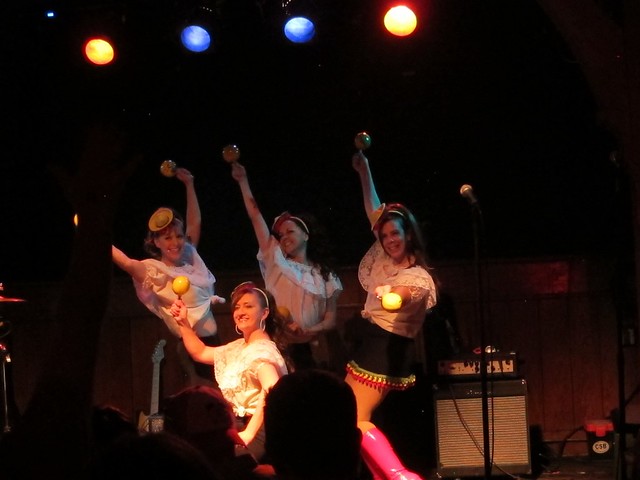

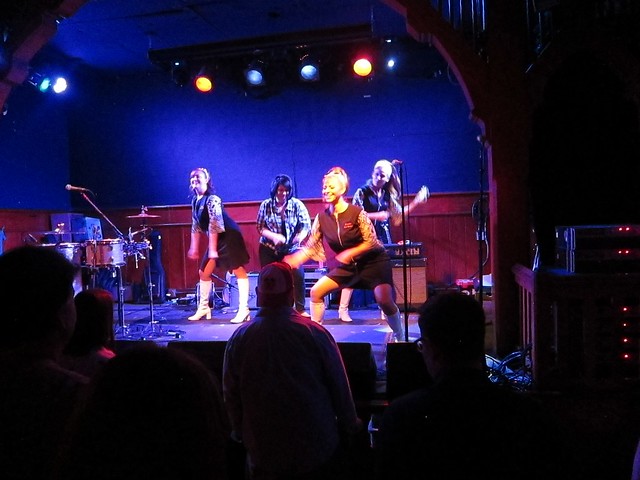
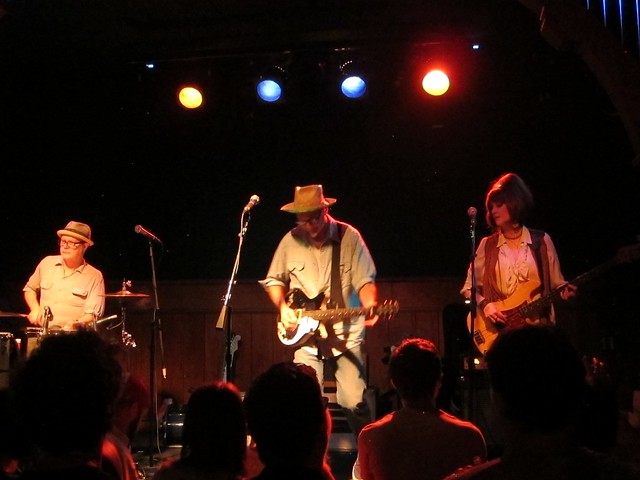
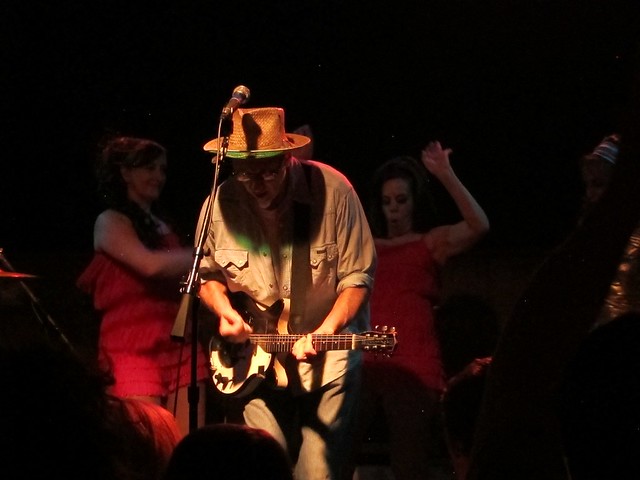
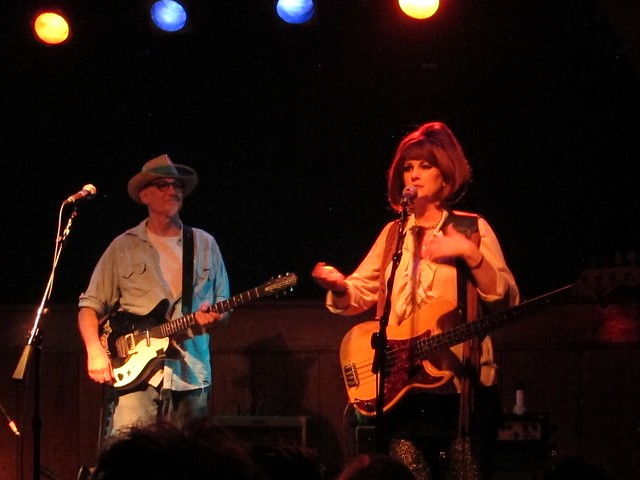


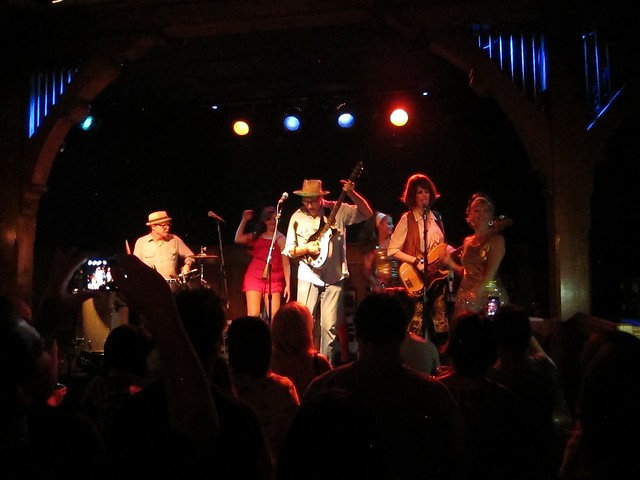

 Imagine the scattered groups in the 1960s that invented the various flavors of psychedelia. Even in their wildest trips, they probably never dreamed their legacy would still be around some 50 years later, popping up all over the world. Driving that point home, Greek tripsters Acid Baby Jesus have taken up the retro freak flag, adding their own modern touches. Selected Recordings shows that they've studied the past for more than just the surrealistic band-naming conventions and that they can occasionally rise above their sundry influences. Fragmented reflections of The Animals, It's a Beautiful Day, and the Zombies flicker around the edges, but Acid Baby Jesus also tap into more modern garage psych sounds like Thee Oh Sees and Nobunny. While Selected Recordings is a pleasant retreat from reality, the first half of the album is strongest, with better production and arrangements.
Imagine the scattered groups in the 1960s that invented the various flavors of psychedelia. Even in their wildest trips, they probably never dreamed their legacy would still be around some 50 years later, popping up all over the world. Driving that point home, Greek tripsters Acid Baby Jesus have taken up the retro freak flag, adding their own modern touches. Selected Recordings shows that they've studied the past for more than just the surrealistic band-naming conventions and that they can occasionally rise above their sundry influences. Fragmented reflections of The Animals, It's a Beautiful Day, and the Zombies flicker around the edges, but Acid Baby Jesus also tap into more modern garage psych sounds like Thee Oh Sees and Nobunny. While Selected Recordings is a pleasant retreat from reality, the first half of the album is strongest, with better production and arrangements. Browsing through retro-inspired rock band offerings is like picking your favorite movie franchise reboot. Occasionally, an album strikes a nerve, but nothing can really replace dropping the needle on The Velvet Underground and Nico, sinking back into thrashy joy of The Pretenders, or sampling the cream of late '60s psychedelic pop bands from Northern California on a Rhino collection. It's hard for younger bands to slide in deeply enough to get past the simple surface characteristics, and those that come closest to the elusive feel rarely have enough personality to be memorable.
Browsing through retro-inspired rock band offerings is like picking your favorite movie franchise reboot. Occasionally, an album strikes a nerve, but nothing can really replace dropping the needle on The Velvet Underground and Nico, sinking back into thrashy joy of The Pretenders, or sampling the cream of late '60s psychedelic pop bands from Northern California on a Rhino collection. It's hard for younger bands to slide in deeply enough to get past the simple surface characteristics, and those that come closest to the elusive feel rarely have enough personality to be memorable.  Here’s the pitch: We’ll raise T. Rex’s Marc Bolan from the dead and partner him up with the Cramps, then polish the act to create the perfect bubblegum pop band for a Saturday morning kids’ cartoon series. Call it “So King Tuff!” What makes the act so irresistible is that Kyle Thomas,
Here’s the pitch: We’ll raise T. Rex’s Marc Bolan from the dead and partner him up with the Cramps, then polish the act to create the perfect bubblegum pop band for a Saturday morning kids’ cartoon series. Call it “So King Tuff!” What makes the act so irresistible is that Kyle Thomas,  Too many neo-psychedelic bands mistake freeform anarchy for true psychedelia, thinking that a confused and disoriented listener is functionally equivalent to one who’s been transported. Others assume that they can alchemically transform formulaic progressions into gold if they wrap them in enough distortion and echo. On Maui Tears,
Too many neo-psychedelic bands mistake freeform anarchy for true psychedelia, thinking that a confused and disoriented listener is functionally equivalent to one who’s been transported. Others assume that they can alchemically transform formulaic progressions into gold if they wrap them in enough distortion and echo. On Maui Tears, 
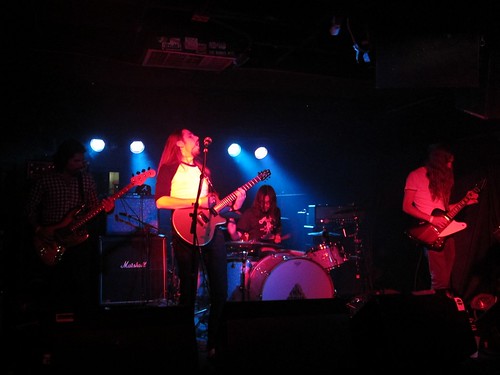

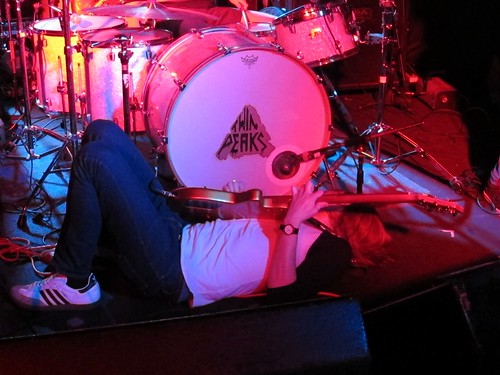
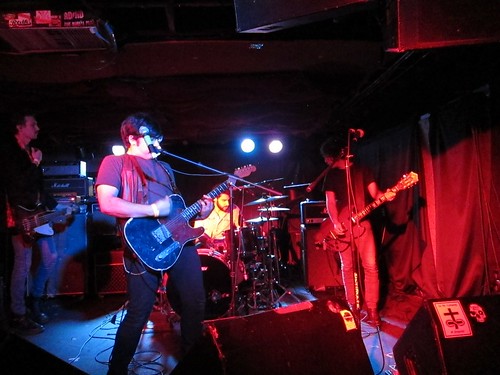
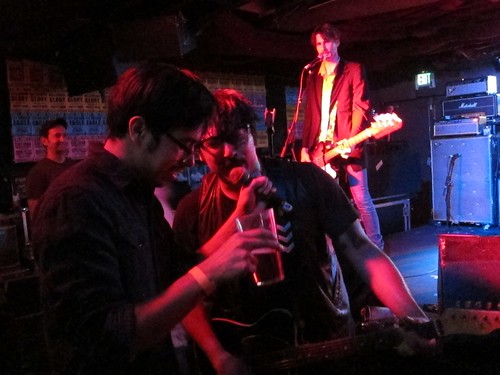
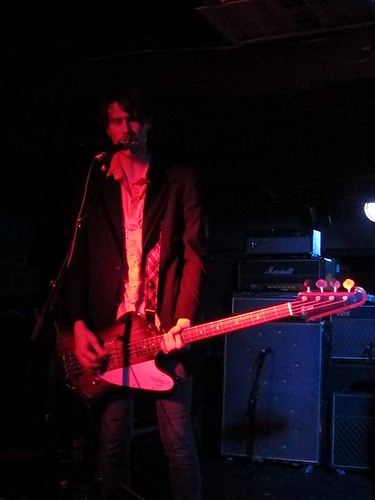
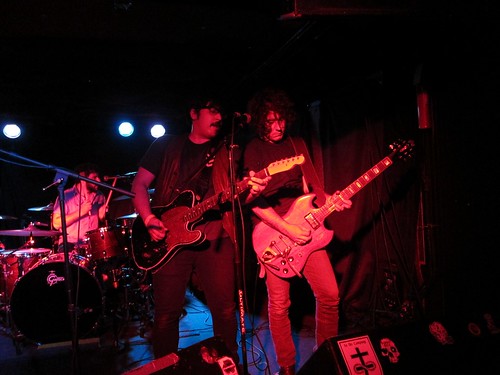
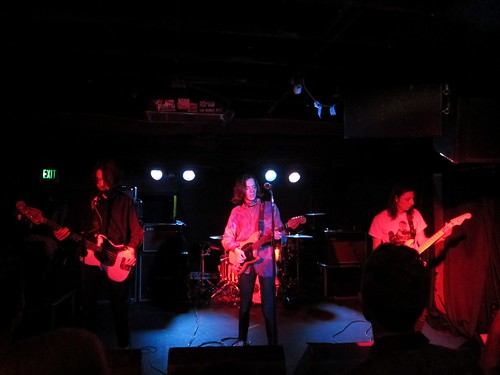

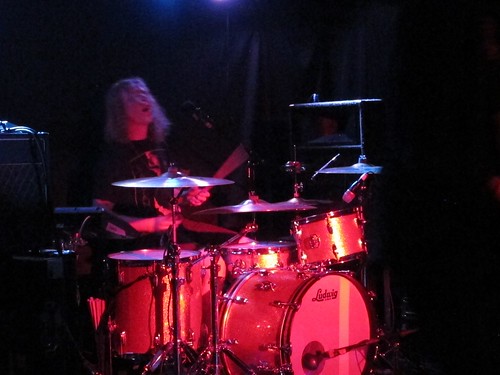

 I first heard
I first heard  Many bands aspire to the retro haze of garage psychedelia, filling their tracks with a messy wall of guitar fuzz and driving beats. Emphasizing the garage side, they revel in the sloppy catharsis of low-fi sound.
Many bands aspire to the retro haze of garage psychedelia, filling their tracks with a messy wall of guitar fuzz and driving beats. Emphasizing the garage side, they revel in the sloppy catharsis of low-fi sound.
